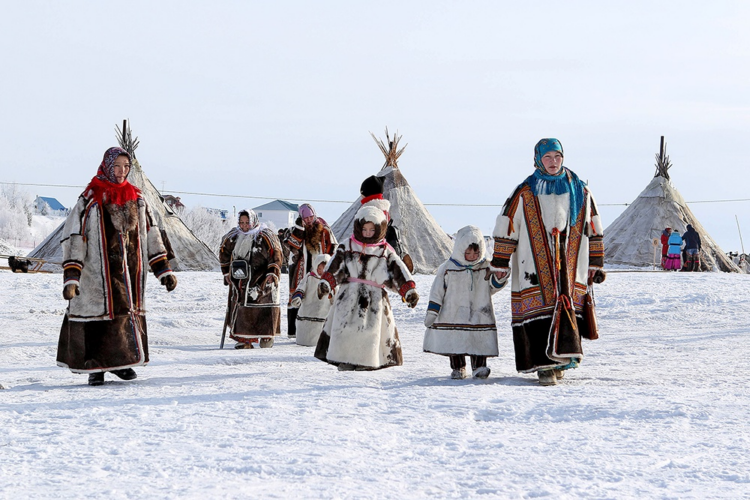Not just a reindeer herder's wife: the profession of "chum worker" has become official
Published: by .

Today, almost 19 thousand indigenous peoples of the North (mainly the Nenets) in Yamal, like centuries ago, move with herds of reindeer from pasture to pasture, living in tents. Being a reindeer herder is still very prestigious, especially when you have a herd of two or three thousand heads, but being a tent worker – the wife of a reindeer herder and the mistress of the house – is hard work. The woman's responsibilities include, for example, putting up a tent from dozens of heavy poles, throwing reindeer skins into it. Moreover, this must be done in no more than 40 minutes, otherwise, in temperatures of -50 and with wind, the whole family will simply freeze. In addition, the woman needs to sew clothes for the entire large family, fur coats, and high boots from reindeer skins. The responsibilities of the tent worker also include cutting up carcasses and preparing food.
At the same time, the wives of reindeer herders do not receive a salary yet. And fortunately, such a profession as "nomadic dwelling worker" or, more simply, a chum worker, has now been officially recognized. So that women who roam the tundra and are engaged in reindeer herding with their husbands receive a salary and pension on an equal basis with others. After all, a chum worker is far from a housewife, this is a separate professional specialization.
Today, fewer and fewer indigenous women of Yamal agree to roam the tundra with men, scientists from the Arctic Research Center note.
For now, they are increasingly staying to work in the villages. Especially when there is a school there and there is no need to send children hundreds of kilometers away to a boarding school. Even with an average level of education, indigenous women can find work, but nomadic men usually have nothing to do in the villages. As a result, reindeer herders are left alone in the tundra. Today, there is often only one woman for several tents.
At the same time, as scientists note, the birth rate among the nomadic peoples of Yamal is currently at a consistently high level. Families have four to five or more children. As the study showed, the reproductive health of women living in the tundra has its own characteristics. Nomadic women have fewer abortions, unlike those who live in cities and towns. But at the same time, they more often have premature termination of pregnancy, miscarriages. This is a result of the fact that women in the tundra are forced to work until the last minute. They often go to the maternity hospital only when the waters begin to break. Today, as the chum workers themselves say, there are no problems with sending to the hospital: a helicopter arrives at the first request. And the medical centers of Yamal are equipped with the latest equipment. The trouble is that snowstorms often occur in the tundra, and it is also difficult to find a camp in the dark if the birth occurs at night.
Scientists from the Arctic Research Center have proposed creating mini-hotels of sorts at maternity hospitals so that indigenous women could live there for a while before and after giving birth, along with their other small children. In this case, childbirth would be more successful, and the children would not be separated from their mothers.
On topic
Since 2021, Yamal has been implementing a unique measure of support for nomadic families with many children, called "Chumovaya Kapital". It includes everything necessary for running a household in nomadic conditions: poles and seasonal coverings for a chum, a stove, boards, and sleds. The cost of one set is more than half a million rubles. Since 2025, chumovaya capital has been issued to families after the birth of their second child. Already 392 families with many children have received chumovaya capital in Yamal. Another 150 sets are planned for issue this year.
Comments